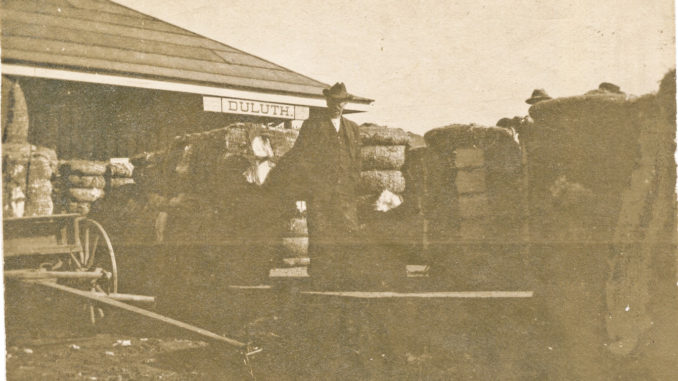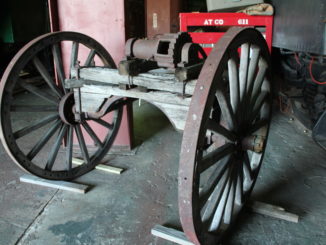
Photo courtesy of Kathryn Parsons Willis
Following the Civil War, the railroad was the most important industry that African Americans worked in. In the South, freed slaves had few fates to choose from, among them sharecropping, domestic service, and railroading. Working on the railroad was a low-paying but steady job with many positions that were nearly exclusively occupied by black workers. Southern railroads were eager to hire black workers after the war because they could pay them far less than white employees.
The pattern of what jobs blacks could hold was set during slavery. Thousands of enslaved black men worked on the railroad until and during the Civil War. Many southern railroads would hire, rent, or own slaves who would work alongside white laborers being paid for their work. Certain positions could be held by both slaves and free men, including brakeman and fireman, and others, usually the more physically intensive jobs like track building and maintenance, were almost entirely the domain of African Americans. Blacks were prevented by law from holding more skilled jobs, like engineer, though slaves skilled in blacksmithing, masonry, and carpentry worked on the railroads, too.
The work, especially laying track through rough terrain and tunnels, was hard and was done manually using shovels, picks, axes, black powder, wheelbarrows, ropes, mules, and horses. The rail, ties, and spikes were all very heavy, and tracks had to be aligned precisely 4’ 8½’’ apart or the trains traveling across them would derail.
Working as part of the train crew was not easy, either. Before automatic air brakes and modern couplers, blacks working as brakeman stood a high chance of injury while working on a train. To stop a train, brakemen would turn a wheel on each individual car to apply brakes on that car. For trains of any length, brakemen would hop between the roofs of train cars to apply brakes and could fall off and be crushed. The same was true when coupling cars: when dropping the pin to secure a coupling, any error could result in crushed hands or fingers. After the development of knuckle couplers and automatic air brakes, the brakeman’s job became much safer, and more attractive to whites. Blacks began to be pushed out of these jobs in the late 1800s.
There was one job on the railroad for which black men were hired exclusively: the Pullman porter. George Pullman pioneered luxurious sleeping-car accommodations on trains, and part of the experience was being served by a humble, uniformed porter. Pullman, very aware of racial conceptions, used his company’s porters to appeal to middle class Americans who did not have a servant or butler at home: now they could experience this upper-class comfort aboard a Pullman car. In the 1920s, the Pullman Company was the largest single employer of African American men. Employment as a Pullman porter was considered prestigious as it offered the opportunity to travel across the country and a life largely free of heavy physical labor. But the porters were also mistreated, underpaid, overworked, and subjected to much abuse and indignity from passengers. Many travelers didn’t bother to learn the porters’ names, instead addressing them as ‘George’ and treating them as a piece of equipment.
Some of the earliest civil rights groups were formed by black railroaders. In 1937, the Brotherhood of the Sleeping Car Porters was recognized as the first official African American union with A. Philip Randolph as its leader. Randolph utilized the power of the labor union and the unity that it represented to demand significant social changes for African Americans nationally and was an inspiration for civil rights leaders including Dr. Martin Luther King Jr. and Malcolm X.
Resources:
The African American Railroad Experience (2010)
By Maureen Cavanaugh and Pat Finn
KPBS: https://www.kpbs.org/news/2010/mar/23/african-american-railroad-experience/
Been Workin’ on the Railroad (2012)
By William G. Thomas
The New York Times: https://opinionator.blogs.nytimes.com/2012/02/10/been-workin-on-the-railroad/




Be the first to comment